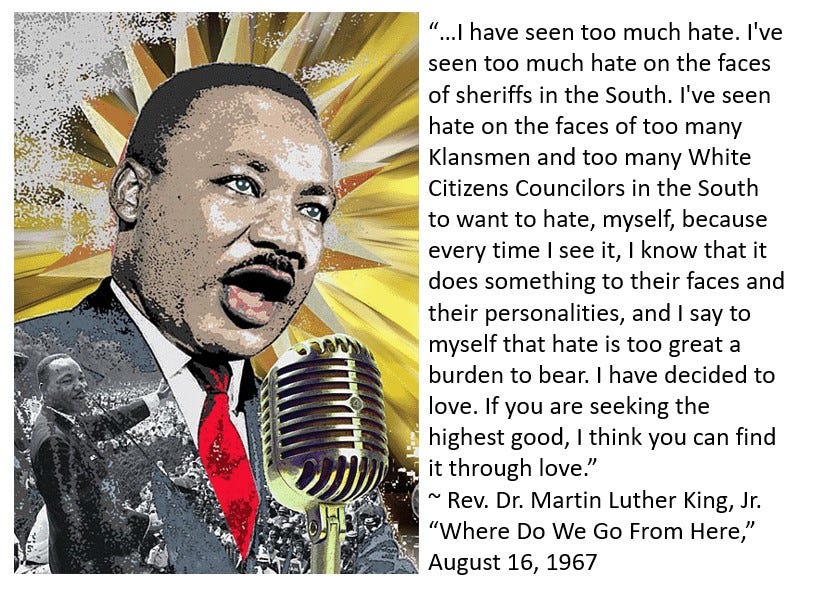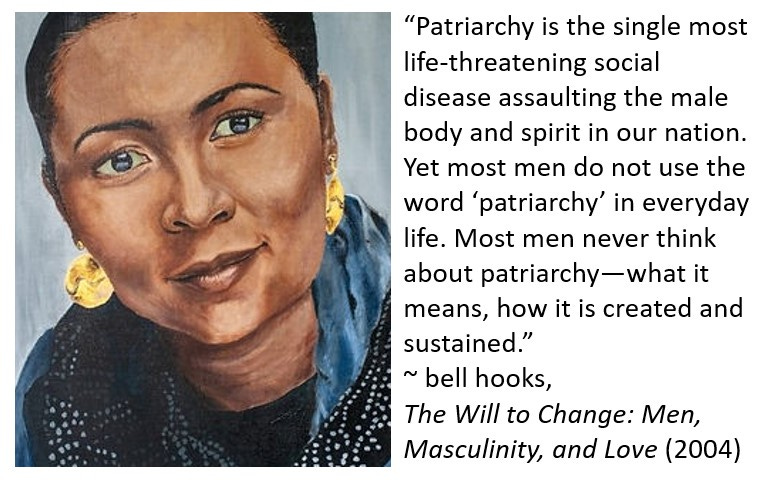bell hooks: Living by an Ethic of Love
Part II of a four-part series exploring the ideas of feminist theorist, cultural critic, and public intellectual, bell hooks
As was true of Rev. Dr. Martin Luther King, Jr., the late pioneering public intellectual, bell hooks’ was as committed to an ethic of love as she was fierce in her criticism of injustice. She noted that her in-person presentation never quite matched the fierce intellectual people expected from reading her books. Rather than a statement of incongruence, my sense is that this rather proves her commitment to integrity: to pushing one’s self past the natural niceties to honor more pressing principles of truth and love.
hooks consistently noted that the ethical principle of loving people was the basis of her political project and cultural analysis. In a 2017 interview hooks highlighted Rev. King’s consistent emphasis on the love ethic as something, now, too often left out of political discourse.
“[King] talked about love as a transformational source. It’s come down to us as a sort of watered-down version of ‘Love your neighbor as yourself,’ not as an empowering force that changes everything. I love Dr. King’s book, Strength to Love, in which he talks about the courage it takes, in the midst of domination, to decide to love.”
In his 1967 address, “Where Do We Go From Here,” Rev. King explained that love was the fundamental answer to humanity’s problems, and that he would continue to emphasize love despite the critical perception that such talk was naïve or politically irrelevant. He began by making it clear that he was advocating for a kind of love that was both “strong” and “demanding” rather than a sentimental love—”emotional bosh,” as he put it.
“…I have seen too much hate. I've seen too much hate on the faces of sheriffs in the South. I've seen hate on the faces of too many Klansmen and too many White Citizens Councilors in the South to want to hate, myself, because every time I see it, I know that it does something to their faces and their personalities, and I say to myself that hate is too great a burden to bear. I have decided to love. If you are seeking the highest good, I think you can find it through love.”
Like King, hooks found audiences interested in her social analysis irritated with her discussion of love. In All About Love: New Visions (2001), hooks wrote:
“When I travel around the nation giving lectures about ending racism and sexism, audiences, especially young listeners, become agitated when I speak about the place of love in any movement for social justice. Indeed, all the great movements for social justice in our society have strongly emphasized a love ethic. Yet young listeners remain reluctant to embrace the idea of love as a transformative force. To them, love is for the naïve, the weak, the hopelessly romantic. Their attitude is mirrored in the grown-ups they turn to for explanations.”
In her book, Writing Beyond Race: Living Theory and Practice (2013), hooks quoted from King’s 1963 interview with Kenneth Clark in which he defended his commitment to nonviolence in the face of white terrorism.
“Many of the psychiatrists are telling us now that many of the strange things that happen in the subconscious and many of the inner conflicts are rooted in hate and so they are now saying ‘love or perish.’ Erich Fromm can write a book like The Art of Loving and make it very clear that love is the supreme unifying principle of life and I’m trying to say in this movement that it is necessary to follow the technique of nonviolence as the most potent weapon available to us, but it is necessary also to follow the love ethic which becomes a force of personality integration.”
King’s mention of the pioneering social theorist and humanistic socialist is significant. hooks frequently drew inspiration from and directly referenced Fromm’s work. (In fact, I first learned of this now under-heralded thinker from reading hooks.) In The Art of Loving (1956), Fromm challenged the conception of love as a passive emotion limited to romantic relations. The basis of all forms of love, explained Fromm, was a basic realization in the shared dignity and humanity of each and every person. Speaking to the active character of love, Fromm wrote,
“Love is an activity, not a passive affect; it is a ‘standing in,’ not a ‘falling for.’ In the most general way, the active character of love can be described by stating that love is primarily giving, not receiving.”
Like King, hooks drew on Fromm’s conception of love and assessment of its role in creating a humanistic egalitarian society. “Love is mostly about the action,” wrote hooks,
“not the definition. Drawing on Erich Fromm, I see love as a combination of six ingredients: care, commitment, knowledge, responsibility, respect, and trust. They form a basis for action. It’s not about what you’re feeling or how you’re defining love. The real question is: what is the action you’re taking?”
hooks' commitment to the love ethic was powerfully expressed in her concern for and critical examination of men.
Loving Men by Understanding Patriarchy
bell hooks believed in the power of words and communication. She believed we needed to name the ideology and practice that systematically denigrates and oppresses women: patriarchy. In The Will to Change: Men, Masculinity, and Love (2004), one of the most important feminist examinations of men and masculinity, hooks explained that patriarchy is a
“political-social system that insists that males are inherently dominating, superior to everything and everyone deemed weak, especially females, and endowed with the right to dominate and rule over the weak to maintain that dominance through various forms of psychological terrorism and violence.”
hooks’ criticism of the destructiveness of patriarchal masculinity did not devolve into writing off men. Like few authors have done, hooks recognized that patriarchal privilege comes at an enormous cost to men even as many of them do not know or understand patriarchal culture. In The Will to Change, hooks wrote,
“Patriarchy is the single most life-threatening social disease assaulting the male body and spirit in our nation. Yet most men do not use the word ‘patriarchy’ in everyday life. Most men never think about patriarchy—what it means, how it is created and sustained.”
hooks’ vision of feminism not only targeted patriarchy’s violation of women’s dignity; it lovingly confronted the trauma and dehumanization patriarchy inflicted upon men. She wrote that males are the chief victims of patriarchal violence in that they are required to
“engage in acts of psychic self-mutilation, that they kill off the emotional parts of themselves. If an individual is not successful in emotionally crippling himself, he can count on patriarchal men to enact rituals of power that will assault his self-esteem.”
hooks was unwilling to ignore male privilege and the harm many men do by uncritically adhering to patriarchal masculinity. But she was also fiercely critical of the idea that male privilege meant that man had it all. “Rather than bringing us great wisdom about the nature of men and love,” she wrote, “reformist feminists focus on male power reinforced the notion that somehow males were powerful and had it all.” What men lost in the embrace of patriarchy was nothing short of love and authenticity. In The Will to Change she wrote:
“Feminist writing did not tell us about the deep inner misery of men. It did not tell us the terrible terror that gnaws at the soul when one cannot love. Women who envied men their hardheartedness were not about to tell us the depth of male suffering. And so it has taken more than thirty years for the voices of visionary feminists to be heard telling the world the truth about men and love.”
hooks cared too much about men and believed too much in their humanity to accept patriarchy’s pessimistic assessment that “boys will be boys.” She invited men to do more than embrace feminism as a means of supporting women. She encouraged us to exchange our chivalrous solidarity with a commitment to the far more difficult work of self-examination and personal transformation. Such a commitment to integrity and growth would be the truest path to support salvation from sexism.
hooks urged men to embrace “feminist masculinity,” to be feminist men: men who exemplify the very best in feminist values. Men who strove to be compassionate, congruent, sensitive, caring and respectful of others, authentic communicators, loving, respectful of women’s humanity, and opposed to the normalization of violence, force, and exploitation comprising systems of domination. She understood that the solution to many problems feminists have sought to remedy is to help men do what patriarchy prevents them from doing: become fully human.
Honoring hooks' by Committing Ourselves to Love
Our society faces many problems at present, not least of which is the question whether or not “love is dead.” Too many of our political leaders and so-called public figures speak in pure instrumentalized calculations. Love is not honored as the elemental basis of our personal and political projects. At best it is allowed to fall by the wayside. At worst, it is treated as a triviality or frivolous distraction.
hooks joined King and Fromm before her to challenge us to recognize the love of humanity—the honoring of human dignity—as the inspiring impetus for combating human oppression; as a foundational principle for living of a good and true life. If such thinking is true then it is not enough to, as King once remarked, “fling a coin to a beggar,” we must infuse our political and social projects with an uncompromising love of our fellow human beings, including those we believe are most misguided.
If you enjoyed this post please share it with others and like it by clicking the heart icon. Be sure to subscribe if you haven’t already.
Invite Dr. Nall to Speak
Dr. Nall delivers energetic live presentations and engaging workshops on the subjects featured in Humanities in Revolt. Those interested in booking a workshop or talk can get in touch through Facebook or by leaving a comment.











I love this. I would show my students love and try to model this way of life. Many would write about the feeling of love in my classroom. It's all about love and let's kick down the ivory tower. bell hooks was a big part of my graduate school reading list. She was a visiting professor at my PhD program decades ago. Electrifying human.